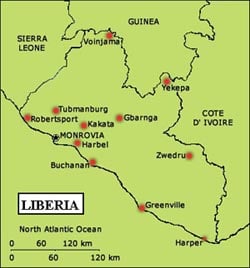MONROVIA
Liberian rebels seized the strategic town of Kley Junction, 37 km west of the capital, Monrovia, as fighting resumed between government troops and two rebel groups on three fronts, threatening a fragile 17 June ceasefire.
Relief workers in Monrovia told IRIN that the rebel Liberians United for Reconciliation and Democracy (LURD) overran Kley Junction early on Thursday morning, raising fears that they could mount a third assault in two months on Monrovia.
Liberian Defense Minister Daniel Chea was quoted by international news agencies on Thursday afternoon as saying the LURD had advanced past Kley Junction to Sastown, 20 km from Monrovia. "The military situation is developing into a full-scale attack against our positions," Chea said.
Clashes were also going on between government fighters and rebels of the Movement for Democracy in Liberia (MODEL) in the southeastern Sinoe County, the relief workers added.
On Wednesday, General Benjamin Yeaten, the Liberian government frontline commander, told reporters that MODEL attacked government positions at the port town of Greenville, Sinoe County, 250 km southeast of Monrovia and at Belliewaley, a town in lower Nimba county, 280 km northeast of the capital.
LURD leaders attending Liberian peace talks in the Ghanaian capital, Accra, however alleged their positions were attacked by government troops, a diplomatic source said. "They said they are only defending themselves from a government attack," the source said.
Kley junction links Monrovia to the Sierra Leone border and to the rebel main stronghold of Tubmanburg, which is also the provincial headquarters of Bomi County. It was the springboard for previous rebel attacks on Monrovia.
The sound of light weapons fire from the direction of Kley Junction could be heard around the government controlled Po-River area, 17 km west of the capital, defense sources in Monrovia told IRIN.
Reports of renewed fighting coincided with the launch of a church crusade by President Charles Taylor, during which he vowed not to fight anymore. He told people attending the prayers that he would step down and leave the country, but after the arrival of international peacekeepers.
"It is important for the international community to act now to bring peacekeepers to Liberia," Taylor said, adding that he would "not stand in the way of peace".
Taylor is under intense international pressure to leave Liberia. Nigeria has offered him asylum, however he insists that he will leave only after a US-led international peacekeeping force arrives to prevent chaos.
US President George Bush sent an assessment team to Liberia last week to determine the humanitarian and military situation. He has promised to send some troops to join an ECOWAS-led force but after Taylor leaves.
The Economic Community of West African States (ECOWAS) expects to send the first 1,500 peacekeepers to Liberia next week, according to diplomats. However a Joint Verification Team (JVT) set up, under the terms of the 17 June ceasefire, to identify the positions of various fighting groups was still in Sierra Leone.
The ceasefire which was violated several times before a truce between government forces and rebels resurrected it, was meant to pave way for a comprehensive peace agreement leading to a transitional government in Monrovia.
UN Secretary-General Kofi Annan warned that delayed deployment of peacekeepers could make the situation more dangerous. "I had hoped that they [the peacekeepers] would do it by the end of this month, but the latest calendar I saw seems to indicate it might be later than that," Annan said.
"That is very worrying because the longer we delay the deployment the more dangerous the situation gets. I have asked my military advisers and other officers to be in touch with the ECOWAS forces, with the US, to see what can be done to accelerate their deployment," he added.
Hundreds of people were killed in the last two attacks and 100,000 displaced from camps in Monrovia's suburbs into the city centre. Aid agencies, which are trying to assist the displaced said continuing insecurity had hampered their activities.
World Vision said on Wednesday that displaced people in Monrovia continued to be plagued by frequent incidents of rape, abduction, armed robbery and looting. They were also short of food, clean water and basic health services.
This article was produced by IRIN News while it was part of the United Nations Office for the Coordination of Humanitarian Affairs. Please send queries on copyright or liability to the UN. For more information: https://shop.un.org/rights-permissions




